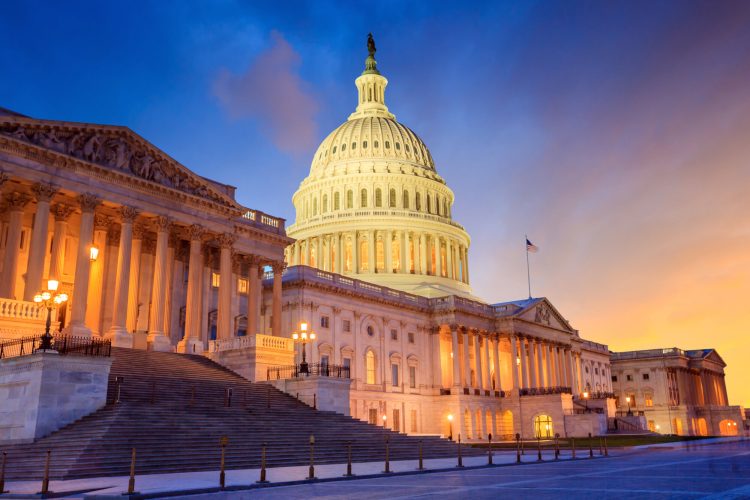This week on Facing the Future, we take a deep dive into the broken federal budget appropriations process in Congress with journalist David Lerman, editor of Congressional Quarterly Budget (CQ Budget). Lerman previously covered national security, defense spending, and foreign policy matters for Bloomberg News. Concord Coalition policy director Tori Gorman joined me for that conversation.
Later on in the program, we mark the 30th anniversary of Concord Coalition co-founder Paul Tsongas’ victory in the 1992 New Hampshire Democratic Presidential Primary by looking back at that campaign’s significant achievement with Brian Keane. Keane was a key Tsongas presidential campaign staffer who later became national field director for The Concord Coalition. He is now President of SmartPower, a non-profit organization focused on renewable energy and energy efficiency.
Lerman describes an atmosphere in Congress so polarized that even simple measures, like a temporary funding bill to prevent a government shutdown, dissolve into partisan bickering. Federal funding expires on February 18th, but fights over vaccine mandates and how drug treatment money is spent are threatening to derail what should be a non-partisan administrative vote on a 3-week stopgap measure. Lerman believes the appropriations process is horribly broken, even after the reintroduction of earmarks.
“This is just what happens when they can’t have power by any other means, they use the stop-gap funding measure because it’s a must-pass bill, and everybody knows that,” said Lerman. “So every Senator is a king or a queen because it only takes one of them to hold things up in the Senate. They know they have that power and they’re more than happy to use it whenever they can to make a political point. And that’s why even a simple three-week stop gap is such a heavy lift. This is the third one we’ve had to do since September. That’s how far behind they are and how broken this process is.”
Finding agreement on a full-year spending bill is similarly challenged as lawmakers use the FY 2022 appropriations bills to wage proxy fights over abortion rights, but Lerman says he sees signs that Congressional appropriators from both parties are making progress towards a comprehensive federal budget plan for the current fiscal year, chiefly because neither side wants to operate under the restrictions of a continuing resolution for the entire year.
At the end of the day, Lerman says the entire budget process needs to be revamped, and assigns responsibility for the current mess to the leadership of both political parties.
“There is no reason the leaders couldn’t have sat down a year ago and come up with bipartisan top-line spending levels so they could get the process moving,” said Lerman. “This is really a leadership issue. The appropriators do work hard, they mean well for their constituents. The top congressional leaders don’t sit down to make the hard call fiscal decisions until very late in the process. That has to start at the front end. If they made these bipartisan spending deals at the front end, appropriators would have time to do their work and actually get it done on time. But what happens is they just sort of start the process and pass partisan spending bills in the house that they know aren’t going anywhere, and just let the process play along until ‘uh-oh we’re trapped, and we’re stuck and we’re out of time’.”
Later in the program, I look back 30 years ago this week to Paul Tsongas’ victory in the New Hampshire Democratic Presidential Primary that came as an enormous surprise across the nation to many political observers. Brian Keane – who was a key staffer to the campaign and helped set up the New Hampshire operations – says it was Tsongas’ message of fiscal responsibility, environmental stewardship, and economic growth that really caught on. And, with the help of some guerilla tactics, turned the campaign’s humble beginnings into a national platform.
“Everyone discounted our campaign. Paul and I would travel around and I just remember going into an ice cream shop – just the two of us – and nobody knew who he was. We put together this army up there of people who actually believed,” said Keane. “It wasn’t just personality driven like we see today in politics. It was message driven by what Paul was talking about. It was about fiscal responsibility. It was about responsibility for the long term, of what each individual person collectively could do for our country and for future generations. It was really inspiring. When he won the New Hampshire primary, it was like thunder struck.”
Hear more on Facing the Future. I host the program each week on WKXL, NHTalkRadio.com (N.H.), and it is also available via podcast. Join me and my guests as we discuss issues relating to national fiscal policy with budget experts, industry leaders, and elected officials. Past broadcasts are available here. You can subscribe to the podcast on Spotify, Pandora, iTunes, Google Podcasts, Stitcher or with an RSS feed. Follow Facing the Future on Facebook, and watch videos from past episodes on The Concord Coalition YouTube channel.
Continue Reading










